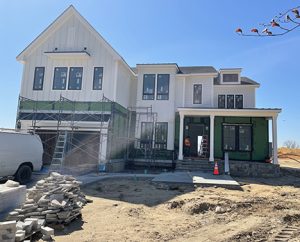
from the Home Fire Sprinkler Coalition
Residential sprinkler systems, as the name suggests, are designed to put out fires that can happen in places where people live, including homes, apartments, and condos. But their impact goes beyond protecting the people and property inside the residence—a properly installed residential sprinkler system can benefit first responders, the environment, and the community, too.
First Responders
If a fire starts, the closest sprinkler activates automatically in response to the high heat from a fire. That controls and often extinguishes the flames, reduces the spread of toxic and damaging smoke, and provides time for occupants to escape. When sprinklers are present, fire is kept to the room of origin 96% of the time (NFPA). In most home fires, only one or two sprinklers will control the blaze. In fires in unsprinklered homes, the fire spreads widely and more rooms fill with dangerous heat, toxic smoke, and uncontrolled fire, and increase the risk of structural collapse.
All of those conditions create hazardous conditions for first responders who battle the blaze. Firefighters are 11 times more likely to be injured fighting structure fires; 87% of their injuries occur there (USFA 2019). The risk is not limited to fire exposure. Firefighters today face a 9% increase in cancer diagnoses and a 14% increase in cancer-related deaths, compared to the general population in the U.S. (National Institute for Occupational Safety and Health 2017). By reducing the spread and volume of a residential fire, home sprinkler systems are one of the most effective methods to protect first responders from fire and exposure hazards.
Environment
Home fire sprinklers also reduce impacts on the environment. In 2010, FM Global conducted a groundbreaking study of the environmental impact of fire sprinklers. Their research showed that when residential sprinkler systems are installed:
- Greenhouse gas emissions were cut by 97.8%
- Water usage was reduced between 50% and 91%
- Fewer persistent pollutants, such as heavy metals, were found in sprinkler wastewater versus fire hose water
- The high pH level and pollutant load of non-sprinkler wastewater are an environmental concern
In 2021, FM Global reaffirmed this important study, publishing Environmental Impact of Residential Fires Review, documenting that since 2010:
- 1.8 billion lbs. of greenhouse gases have been emitted into the atmosphere due to the lack of home fire sprinklers.
- Installed home fire sprinklers would have reduced greenhouse gas emissions by 97% to 54 million lbs.
Communities
By containing a fire to the room where it started, residential sprinkler systems prevent damage and loss from impacting other families who live nearby. This is especially true in multi-unit structures, where one apartment’s kitchen fire could easily leave several families without a home. But it’s also true for single-family homes. In closely built urban neighborhoods, just a slight shift in wind can spread an unsprinklered and uncontrolled house fire to the home next door. When a house fire burns out of control and the home is a total loss, vacant lots create issues and eyesore for otherwise lively residential streets. By installing residential sprinkler systems, homeowners and developers are ensuring that everyone who lives nearby can experience safe living conditions and stable home values.
Safety in Sprinklers
W&M Fire Protection specializes in residential fire sprinkler systems and can help homeowners and developers select the appropriate system for existing structures or new builds and identify any incentives that might be available to offset installation costs. For more information or a quote, contact Brian Klindworth at 631-472-4500.




